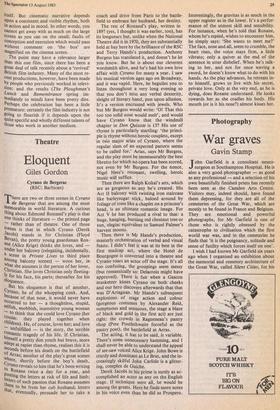Theatre
Eloquent
Giles Gordon
Cyrano de Bergerac (RSC: Barbican)
There are two or three scenes in Cyrano de Bergerac that are among the most memorable in world literature. A curious thing about Edmond Rostand's play is that one thinks of literature — the printed page rather than of theatre. One of those scenes is that in which Cyrano (Derek Jacobi) stands in for Christian (Floyd Bevan), the pretty young guardsman Rox- ane (Alice Krige) thinks she loves, and under her balcony (relegating, incidentally, a scene in Private Lives to third place among balcony scenes) — woos her, in What she assumes is the person of her lover, Christian. She loves Christian only fleeting- 131 for his face, his parts; thereafter for his eloquence.
But his eloquence is that of another, LCYrano, he of the whopping conk. And, oecause of that nose, it would never have occurred to her — a thoughtless, stupid, selfish, snobbish, insensitive young woman to think that she could love Cyrano (her cousin: they played together when children). He, of course, loves her; and love --- unfulfilled — is the story, the terrible romantic tragedy of his life. If Christian, himself a pretty dim youth but brave, more adept at rapier than rhyme, realises this it is seconds before his death on the battlefield of Arras; another of the play's great scenes where, shortly before the boy's death, Cyrano reveals to him that he's been writing to Roxane twice a day for a year, and Posting the letters at risk of life and limb; letters of such passion that Roxane assumes them to be from her cub husband; letters that, eventually, persuade her to take a
coach and drive from Paris to the battle- field to embrace her husband, her destiny.
The rest of Rostand's play, written in 1897 (yes, I thought it was earlier, too), has its longueurs but, unlike when the National Theatre did it in 1970, they are substantially held at bay here by the brilliance of the RSC and Terry Hands's production. Anthony Burgess has translated it, and doesn't he let you know. But he is about our cleverest wordsmith alive, and he's had his own love affair with Cyrano for many a year. I saw his musical version ages ago on Broadway, and it was vapid. Here, he beguiles you to listen throughout a very long evening so that you don't miss any verbal dexterity, sleight of literary hand, pun upon allusion. It's a version encrusted with jewels. Who but Mr Burgess would write: '0! That this too too solid nose would melt', and would have Cyrano know that the windmill chapter in Don Quixote is 13? His use of rhyme is particularly startling: 'the princi- ple is rhyme without heroic couplets, except in two major arias of Cyrano, where the regular slam of an expected pattern seems to be called for.' Arias, says Mr Burgess, and the play must be immeasurably the best libretto for which no opera has been scored, not even by Mr Burgess. For the nonce, Nigel Hess's resonant, swelling, heroic music will suffice.
Then there are Ralph Koltai's sets, which are as gorgeous as any he's created. His Act 11 balcony with twisting iron staircase like barleysugar stick, haloed around by foliage of trees like a chaplet on a princess's head, is an ultimate romantic image. For Act V he has produced a rival to that: a huge, hanging, burning red chestnut tree or sun, elegiac equivalent to Samuel Palmer's harvest moons.
Then there is Mr Hands's production, masterly orchestration of verbal and visual feasts. I didn't feel it was at its best in the first madcap act, where the Hotel de Bourgogne is converted into a theatre and Cyrano roars an actor off the stage. It's all too confusing, the groupings seem messy (but romantically so: Delacroix might have approved). There is fun when a Gascon musketeer kisses Cyrano on both cheeks and our hero discovers afterwards that that was D'Artagnan. Mr Hands's subsequent explosions of stage action and colour (gorgeous costumes by Alexander Reid, sumptuous and sensuous, the stage a blaze of black and gold in the first act) are just right: the crowds in Ragueneau's pastry shop (Pete Postlethwaite forceful as the pastry poet), the battlefield at Arras.
The acting, it has to be said, is variable. There's some unnecessary hamming, and I shall never be able to understand the appeal of see-saw voiced Alice Krige. John Bowe is sturdy and dominant as Le Brut, and the in- creasingly skilful John Carlisle is a glitter- ing, complex de Guiche.
Derek Jacobi in his prime is surely as ac- complished an actor as any on the English stage. If technique were all, he would be among the greats. Here he finds more notes in his voice even than he did as Prospero. Interestingly, the gravitas is as much in the upper register as in the lower. It's a perfor- mance of the utmost skill and sensibility. For instance, when he's told that Roxane, whom he's espied, wishes to encounter him, he simply says: 'She wants to meet me?' The face, nose and all, seem to crumble, the heart rises, the voice stays firm, a little vibrato; only a quiver at the end of the sentence in utter disbelief. When he's talk- ing to her, and not for once waving a sword, he doesn't know what to do with his hands. As the play advances, he retreats in- to himself, grows to live with his secret, private love. Only at the very end, as he is dying, does Roxane understand. He looks towards her as she cradles his body. His mouth (or is it his nose?) almost kisses her.






































 Previous page
Previous page